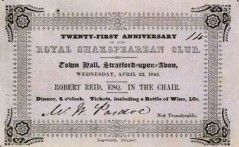  |
|
PROGRAMME DETAILS FOR THE 187TH SEASON 2010/2011
TUESDAY 8 MARCH 2011
DR ANDY KESSON
Lecturer in English, University of Kent; Globe Education Lecturer
Andy Kesson teaches English at the University of Kent and is a Globe Education Lecturer at Shakespeare's Globe. He previously worked in New Writing at Contact Theatre, Manchester and for the BBC, and now teaches and writes about Elizabethan literature and performance. His first book, John Lyly and Early Modern Authorship, is forthcoming with Manchester University Press.
Consider the Lilies: John Lyly and William Shakespeare
When Ben Jonson wished to praise the late Shakespeare in his preface to the First Folio, he did so with reference to only one contemporary writer of comedies: 'our Lyly'. John Lyly has claims to be the best-selling and best-loved writer of Shakespeare's period, but is now largely ignored by readers, theatres and academics. This talk addresses Lyly's legacy to his immediate successors, especially Shakespeare, and asks whether we can ever consider Lyly to be, once again, 'our Lyly'.
Lecture Notes
The 861st meeting of the Shakespeare Club, held on 8 March 2011 at Mason Croft, welcomed Dr Andy Kesson of the University of Kent whose subject was John Lyly, a writer with claims to be the best-selling and best-loved writer of Shakespeare's period and now largely ignored by readers and critics.
Dr Kesson’s talk, ‘Consider the Lillies: John Lyly and William Shakespeare’, co-opted Kirsty McColl singing Sappho’s Lament, a blog ‘The twee life of me’, and a Lego version of Lyly’s play Gallathea to urge the audience to consider Lyly, as Ben Jonson did in his preface to the Shakespeare First Folio, as 'our Lyly'. Dr Kesson recounted the deterioration of Lyly’s literary reputation since the mid 17th century when he was described by his publisher Edward Blount as ‘the only rare poet of that time’. Yet he was responsible for the first English novel in Euphues The Anatomy of Wit (1587) which in its time out-sold Shakespeare, as well as eight plays between 1585 and 1590. His career was one of firsts: Gallathea was the first example of major cross-dressing in a play and the first use of the forest as a place of romantic love, both devices used later by Shakespeare. Lyly was the first playwright to be a commercial success in print. His writing style influenced the sentence structure of a generation. Now in the 21st century Lyly had been rediscovered. He was one of the most popular writers in the Globe’s ‘Read not Dead’ programme and productions of his plays, including some at the Shakespeare Institute, demonstrated that they still worked in performance.
After questions and thanks from the Chair, Ms Mary Reardon, the meeting closed at 9pm and was followed by refreshments.
CLICK TO GO BACK TO MAIN PROGRAMME LIST
|




